Since the birth of Airbnb and the business of people hosting guests in their homes, there have been many changes both in Airbnb and the hosting community. These changes have not all been for the better. In fact, some might say there’s been an overall problematic trend, and it’s become quite commonplace in host communities to read hosts writing about how “Airbnb has lost their vision” or “I wish Airbnb had kept to their original vision”. Often these comments are mixed in with not-so-gentle criticisms of particular policies or practices that, in the minds of many, have made Airbnb and perhaps many hosts as well, lose their way and be somehow “less” than they once were.
So I want to explore this issue — in part to examine what made the early years 
 of Airbnb and hosting more exciting, what problems arose, what were the inferior or problematic choices/policies made by AIrbnb and hosts, and, most importantly, what values do I believe in and advocate for hosts to get “back on track”, if they so choose.
of Airbnb and hosting more exciting, what problems arose, what were the inferior or problematic choices/policies made by AIrbnb and hosts, and, most importantly, what values do I believe in and advocate for hosts to get “back on track”, if they so choose.
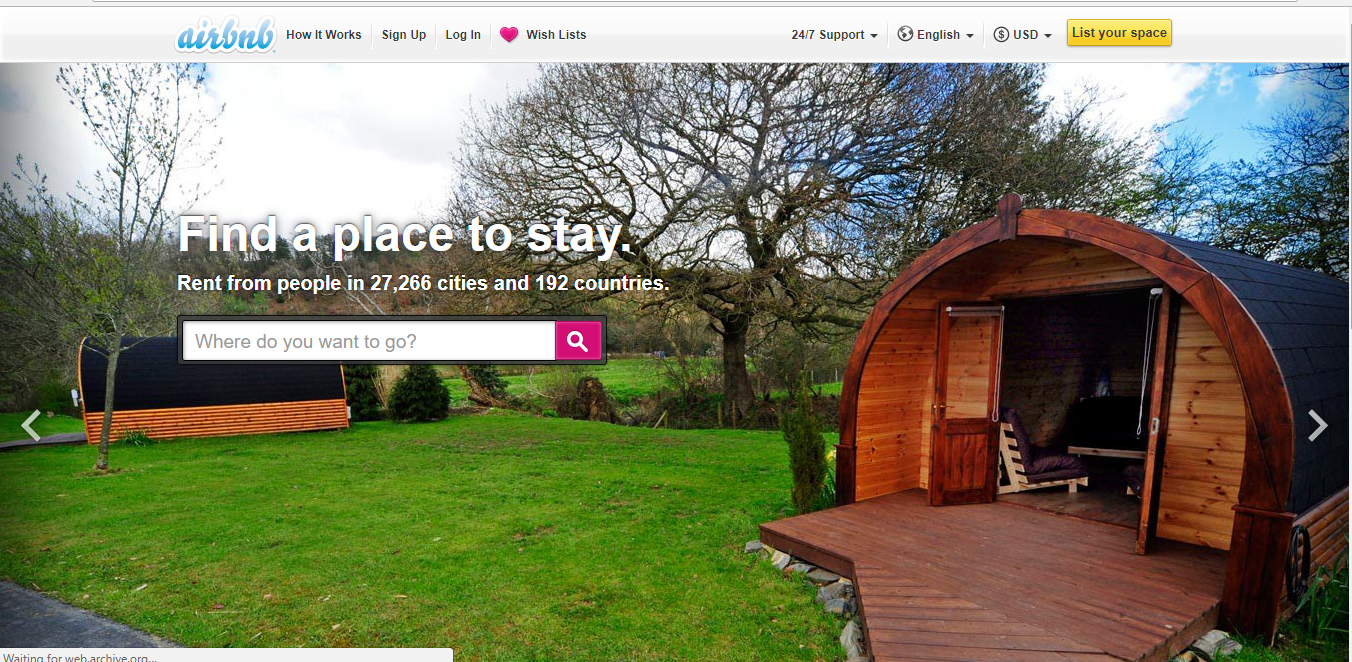
The early years were exciting, first because this was new, and we were few, and we were pioneers on an exciting, fresh horizon, with the world stretching out before us. This was a time of small-time hosting, when the “airbed” part of Air Bed and Breakfast was a shout out to the smallest of small-time hosts, the ones with the most humble of accomodations and the least available extra space. These were the heady heydays when Airbnb was something more or less like “Couchsurfing-Plus”. Not that many people knew about AIrbnb — so those who did could be trusted, there was an implicit secret handshake, and to host in your home, or to book a stay were something relegated to a certain countercultural humble elite.
Yet even in the early days of Airbnb, there was something “hokey” in the AIrbnb atmosphere…there was an enthusiasm for getting to know people and an optimism about connections and belonging, but it could be expressed in a nerdy and hokey way, as we saw here:
Things like this naturally gave rise to satire, particularly as Airbnb showed itself unwilling to come to terms with the prospect of very problematic guests — or the “shadow” in the room of hosting.
Also, the heady enthusiasm and ubiquitous “excitement” (AIrbnb would announce every new development as something they were “excited” about, as though they were all a room of schoolchildren, always eager for new toys), rang hollow to hosts when they read more and more stories of guillotined hosts, hosts who’d been “terminated” and given no reason for the sudden decapitation when they were “banned for life”. This led to many hosts feeling that there was a dark, haunted room behind the happy facade of “belonging” and many hosts expressed a fear that one day, they too would find themselves crushed in the talons of the monster or decapitated by the executioner who hid behind the big “Belonging” Belo.
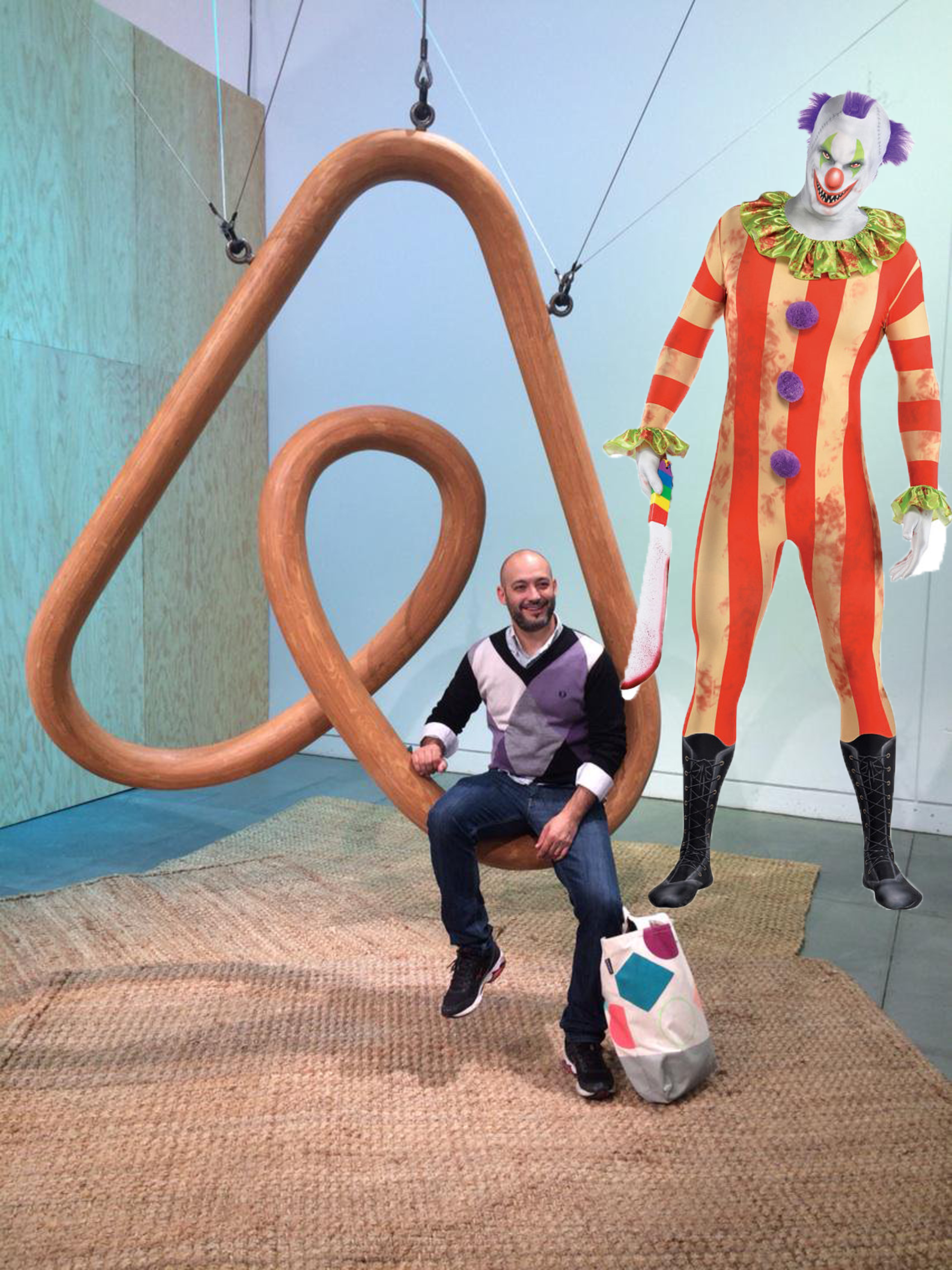
What’s Behind the Belo at Airbnb??
On that note, it should be pointed out that not only is terminating someone’s account and banning them for life with no explanation very disrespectful , but according to new EU rules of the GDPR it is also illegal. As one host put it, terminating with no explanation is like the parent who tells you that you did wrong and will be punished but will not tell you what you did wrong, and when you ask why you’re being punished, just keeps saying “Because I said so, because I said so.”
There are several stories of hosts who’ve had their accounts terminated without being given any explanation, which are posted here:
http://globalhosting.freeforums.net/board/35/problems-working-airbnb-customer-service
Also, here is a story of a host who had an Airbnb guest who wrote a false, defamatory review.
https://www.youtube.com/watch?v=WgGngGlCBnw
Not only did this review effect the host’s hosting business, but Airbnb terminated her account, without hearing her side of the story, based entirely on false information! She sued the guest in small claims court and won. Next step, perhaps: suing Airbnb, because it’s egregiously unfair that a host should have their account terminated over completely false statements.
AIrbnb was intially excited and preached belonging...but were they in love with people, real hosts and real guests, or just an idealistic fantasy of hosting? And particularly with all the new “developments” and app features, many hosts were readily led to wonder if Brian and company had a love affair not with hosting and with people, but with technology. 
Why, if Airbnb promoted “belonging” and why, if Brian kept saying he intended to listen to hosts, was Airbnb so tin-eared, when hosts called in to ask for reimbursement for property damaged by guests, or vandalism or crimes perpetrated by guests? Why did hosts keep saying they had to call Airbnb 4, 5 or 20 times, just to get paid for their damaged property? Why were they being asked to post on a Twitter page, when they wanted to talk to Airbnb customer service? Why, in response to yet another media article about another Airbnb guest trashing a hosts’ home, and the host expressing that they were having difficulty not only getting paid, but even being listened to by Airbnb, did Airbnb keep saying, “We regret our initial response was not up to our standards.” Why couldn’t they just do things right, straight off, instead of waiting until the host went to the media to pressure them to take responsibility? Why was there so much happening that was apparently not up to standards?
Also, as being an Airbnb host became more popular, and I think largely because it became lucrative, the original spirit of hosting was lost, both in hosts and in Airbnb. As many hosts have lamented, Airbnb is pushing hosts to operate more like hotels, and is pushing, particularly through its “Plus” program, a rather boring, uniform and predictable style. Also, hosts on the “Plus” program, though ostensibly an elite, are actually being demoted in that they end up with less control over their own business — they can’t use their own photos, Airbnb writes their listing description, and AIrbnb even dictates to them what furniture or carpets to use.
A not subtle way of pressuring hosts to use instant book, or to allow Air to run their business via making them a Plus listing, is that AIrbnb puts instant book and Plus listings first in the search results, so that if you want to run your business in your own way and refuse these new “options”, you get punished, as AIrbnb actually makes it harder for guests to find your listing. Many hosts have complained that in some places guests have to actively click on something to indicate they dont’ want to seek a “Plus” listing, just to get to ordinary listings.
Though the original “vibe” of Airbnb was humble hosting by small-time hosts in their own home, with all the implied character, quirkiness and soul of such settings, I think the primary reason that this vision did not last, is because the founders of Airbnb — Nate, Joe and particularly Brian — may not have an attunement to this soul quality, a part of ourselves where wisdom lives and grows.
What is soul? Soul is an earthy, salty, type of substance, full of vitality and robust energy. It’s a place where individual uniqueness, even idiosyncrasy, are highly valued. Perhaps most significantly for us as hosts helping each other in host groups, it’s a place where wisdom lives and grows — wisdom as distinct from mere knowledge. What’s the difference between wisdom and knowledge? This may be hard to define, but I present it to you as a koan, something to ruminate and reflect and chew on. For reflection is part of wisdom.
Soul is a spiritual dimension of existence, but the more earthy and chthonic part of spirituality — not the transcendent otherworldliness, but a this-worldly aspect of spirit. If we view transcendent spirituality as correlated to rules, order, principles and doctrines, soul is correlated to art, stories, mythology, symbol and imagery. 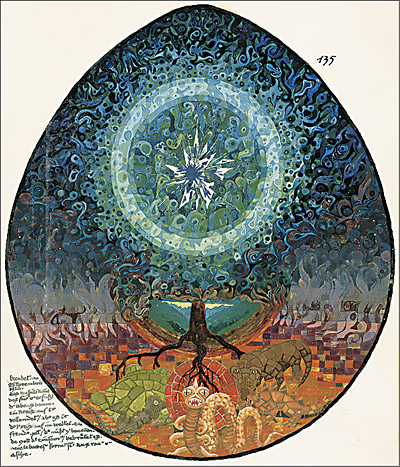 Spirituality may be viewed as more like sitting in zazen, or being a disciple of a mainstream religion, and listening to the yoga teacher or institutional church authorities tell you what to do and think, whereas soul is more like being a Mage or Mystic, and listening to the voice of the earth and the creatures, or your own Inner Guide. It is more closely tied to the unconscious realm, and thus to our dreams and the depths of who we are. Carl Jung, who wrote Modern Man in Search of a Soul, and explored his own soul’s depths in his amazing Red Book,
Spirituality may be viewed as more like sitting in zazen, or being a disciple of a mainstream religion, and listening to the yoga teacher or institutional church authorities tell you what to do and think, whereas soul is more like being a Mage or Mystic, and listening to the voice of the earth and the creatures, or your own Inner Guide. It is more closely tied to the unconscious realm, and thus to our dreams and the depths of who we are. Carl Jung, who wrote Modern Man in Search of a Soul, and explored his own soul’s depths in his amazing Red Book,  (which has been called “The Holy Grail of the Unconcious“) was one of the foremost explorers of the soul in modern times, along with Joseph Campbell. This article, on a website oriented to Jungian psychology, explains something of the map of the soul.
(which has been called “The Holy Grail of the Unconcious“) was one of the foremost explorers of the soul in modern times, along with Joseph Campbell. This article, on a website oriented to Jungian psychology, explains something of the map of the soul.
One way of starting to have insight into the value of soul, is close by to many of us. It’s in our pets. We love animals…in part because they’re cute, in part because they are loving and innocent, or loyal…but there is more. See that doggie butt wiggling, the tail wagging? We think that’s funny…as is the dog who creeps under the table at dinner and stares at you with a baleful imploring look. Animals are uninhibited. So, they can show forth the realms of the subconscious, that we in our civilization, may have a harder time accessing, because the very process of “civilizing” separates us from parts of ourselves, parts that contain some wisdom, some important energy and power. Unfortunately, even though civilization is necessary in the process of growth, this process leads to repression and suppression of good things with the rest of the “id”, and so we can lose access to our own Inner Guide to some extent. This is one reason why animals can be teachers for us, they teach us to listen to our instincts again — which is a part of the soul’s education.
Another phenomenon that can point to soul, is a certain type of humor that is salty and earthy…for instance satire. Big full belly laughs are close to the realm of soul. Being able to laugh at ourselves, and engage in gentle self-deprecating humor, is an earmark of soul…and we can compare this soulful humor to forms of contemporary humor that seem rather strident and schoolmarmish, even viscious and self-righteous, in comparison. Satire and self-deprecating humor are rarely self-righteous, and so there’s a wisdom they contain which can carry us back to soul. For instance, think of the old Carol Burnett sitcoms, or “Mama’s Family”
Or something from Saturday Night Live that pokes fun at someone who many of us generally support and vote for.
(BTW, in that latter video, “D O” means “Do Over” )
When you find that you can’t laugh at yourself, or you can’t laugh at a a satire on a bloop by or shortcoming or “folly” of a politician you generally support, then you may have taken a tangent off the journey of the soul. The dwellers in realm of the soul are, unlike repressed civilization, cognizant of what is often termed “the elephant in the room” .  When you are in touch with your soul, you are aware of the “shadow” element in yourself, as in any setting or community. And all people and communities have a shadow element. One of the profund truths of the soul is that the more the shadow is suppressed, the stronger it becomes. You cannot sweep an infinite amount of dirt under the rug. Eventually the rug will become a tiny cloth atop a dirt pile grown into a mountain. “What is relegated to the unconscious comes to us as fate”, said Carl Jung, which is a bit of profound wisdom that too many in our times seem to neglect. And ignoring this truth means it will become your fate.
When you are in touch with your soul, you are aware of the “shadow” element in yourself, as in any setting or community. And all people and communities have a shadow element. One of the profund truths of the soul is that the more the shadow is suppressed, the stronger it becomes. You cannot sweep an infinite amount of dirt under the rug. Eventually the rug will become a tiny cloth atop a dirt pile grown into a mountain. “What is relegated to the unconscious comes to us as fate”, said Carl Jung, which is a bit of profound wisdom that too many in our times seem to neglect. And ignoring this truth means it will become your fate. 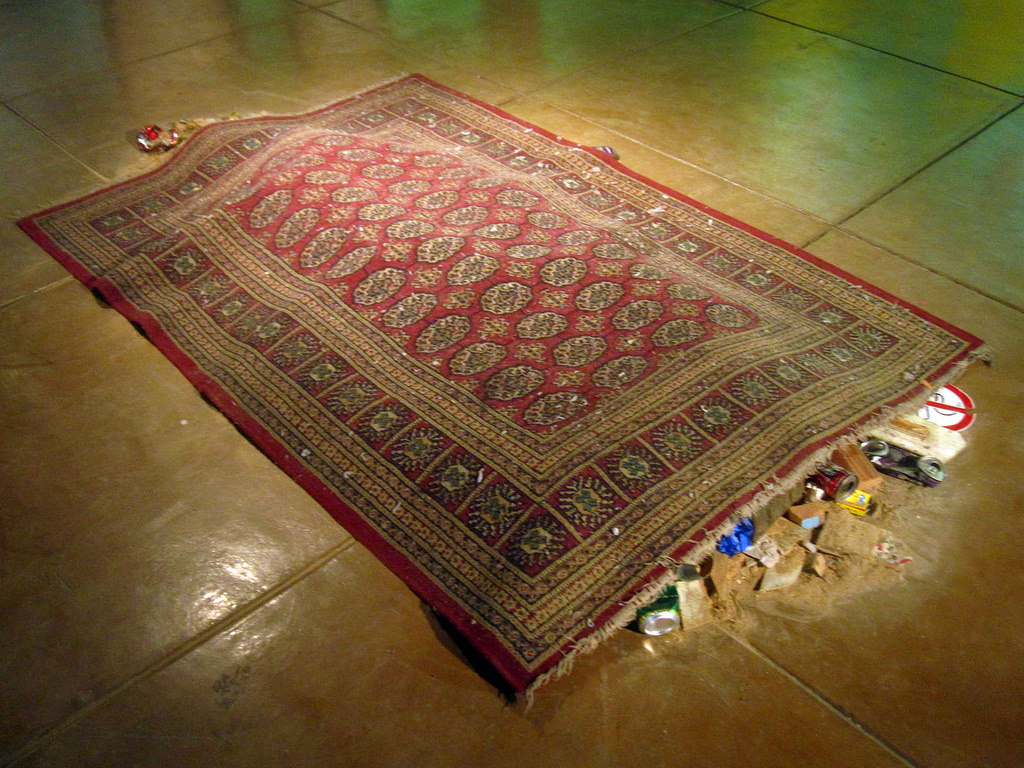
Pause….I hear a question.
What in the world, you may ask, does all this have to do with Airbnb hosting? Well, soul not only has a lot to do with hosting, but it has a lot to do with everything, as from the realm of soul comes the world of Archetypal Psychology, and a way of viewing everything in the world, all phenomena, as representing different archetypes. And the point I am making is that I believe Airbnb is going in the direction it is today — away from what many perceive as its’ “original” vision — primarily because I suspect that its founders have little valuing of this soul quality in human nature, and instead, are captivated by archetypes more aligned with the clean, pure, somewhat minimalist and certainly more “safe, predictable” and boring aesthetic of spirit.  Although in their case they are not representing a mainstream religion, but something more like a “religion” of technology, and a “religion” of the ideal luxury hotel. The clean, white minimalist style, like the clean spare website style of the Airbnb site, can be read as a representation of the refutation of the unconscious, and of the soul who wells up from the unconscious seeking expression in this world. This is not to say that the minimalist aesthetic is inherently lacking in soul, for it certainly can be an expression of a unique soul quality, as can any style or aesthetic. Rather, what I’m calling attention to is the uniformity of style, the imposition of style and the suppression of hosts’ unique selves in all aspects of their business — from how they choose to decorate, to how they choose to run their business and screen guests, — and this is where the problem lies.
Although in their case they are not representing a mainstream religion, but something more like a “religion” of technology, and a “religion” of the ideal luxury hotel. The clean, white minimalist style, like the clean spare website style of the Airbnb site, can be read as a representation of the refutation of the unconscious, and of the soul who wells up from the unconscious seeking expression in this world. This is not to say that the minimalist aesthetic is inherently lacking in soul, for it certainly can be an expression of a unique soul quality, as can any style or aesthetic. Rather, what I’m calling attention to is the uniformity of style, the imposition of style and the suppression of hosts’ unique selves in all aspects of their business — from how they choose to decorate, to how they choose to run their business and screen guests, — and this is where the problem lies.
There’s another issue/theme involved here which I’ll write another article about, which I might call the “Hotel to Home Back to Hotel” shift in Airbnb. AIrbnb started up as a hip alternative to the hotel. But people were booking stays at AIrbnb listings, who weren’t really wanting the full reality of staying in a private home, and made complaints that, well, basically the home was not more like a hotel! If they had really been committed to what they started out seeming to support, Airbnb would have said to these folks, “Scram, get lost, go stay in a hotel. Airbnb listings are not hotels.” But instead of saying that, they began to pressure their hosts to be more like hotels. The “Plus” line and the Luxury line on AIrbnb make this clear, as does the trend by other platforms to create “predictable” or “consistent” short term stays in “catered” situations. For instance see https://www.sonder.com/ This is not “the new hosting”, this in my view is the antithesis of hosting. It’s not hosting, it’s the hotelization of private property.
Like the fear of the Airbnb guest who books a stay in someone’s home, but is afraid that they might find a cobweb there, one wonders if Airbnb’s founders are fearful — do they fear the depths of their own souls? the dark unconscious depths? — for this type of fear could explain someone going in a direction of trying to get rid of these unpleasantries of the real, earthy soul. Airbnb has, after all, pushed a viscious rating system that can result in hosts banned over too many cobwebs, or perhaps just guests’ fears of cobwebs. Airbnb amplified the “extenuating circumstances” policy such that guests can essentially get a full refund if they have a hangnail. Airbnb has forsworn the humble home and its at times humbly dirty hearth, in their push for super duper clean homes and “Super” hosts and “5 star ratings”. Airbnb seems to have turned their backs on idiosyncrasy and style by pushing the dull uniformity of the “Plus” listings. They even turned their back on the very small time host that they themselves once used to be — perhaps now because the founders are billionaires, they now seem more oriented to “mega” hosts with many dozens of listings, boutique hotels, “brands” and other frou-frou savoir faire.
Airbnb’s policies make things more difficult for small hosts, but work well for hotels. Policies like “infants stay for free”, or requirements to accomodate the disabled or those with service animals, non-discrimination policies that make hosts fearful of declining any guest of a “protected group”, the pressure to allow guests to instant book, and now the intentional hiding of the guest photo from the host…all these things are just fine for hotels, who accept basically anyone at any time of the day or night, people who intend to stay for 2 weeks or just 2 hours. But these policies dont’ work so well for hosts who actually (gasp!) live in the home where they have guests, and need to protect both their home and themselves from not only rude people but the criminals, drug dealers and ravers who now regularly book AIrbnb listings. As well, the distorted Airbnb rating system essentially results in hosts being punished for not giving into manipulative guests, or for daring to confront guests who violate house rules, when the guest retaliates with low ratings. Instead of supporting hosts by not penalizing them for doing what they need to do to protect their business, Airbnb, by failing to address the problem of retaliatory ratings (and by placing too much emphasis on the rating system) fails to support guests in taking care of ourselves. And to live holistically means to care for ourselves, in every aspect of our lives, including our business.
Some hosts willingly go along with all Airbnb’s policy changes, in the name of “adapting to the rules of the game”, regardless of what those rules are, how fair or ethical they are, or how disadvantageous or even harmful some of those “rules” are for small in-home hosts. This may be partly “brown-nosing”,  or, in the terminology of soul that we are using here, it could be viewed as “selling one’s soul to get ahead.”
or, in the terminology of soul that we are using here, it could be viewed as “selling one’s soul to get ahead.”
Not that making money is evil — for it certainly is necessary — nor is it necessarily problematic to not object to policy changes by Airbnb. This is not a simplistic, black-and-white issue that I’m trying to call attention to, but one that lives in the inner workings of our hearts, that has to do with our values, our pursuit of meaning in life, or our getting off track in following our heart’s or soul’s call, and allowing ourselves to fall into intertia or what is simply easier to do, as opposed to what is more joyful and meaningful to us. 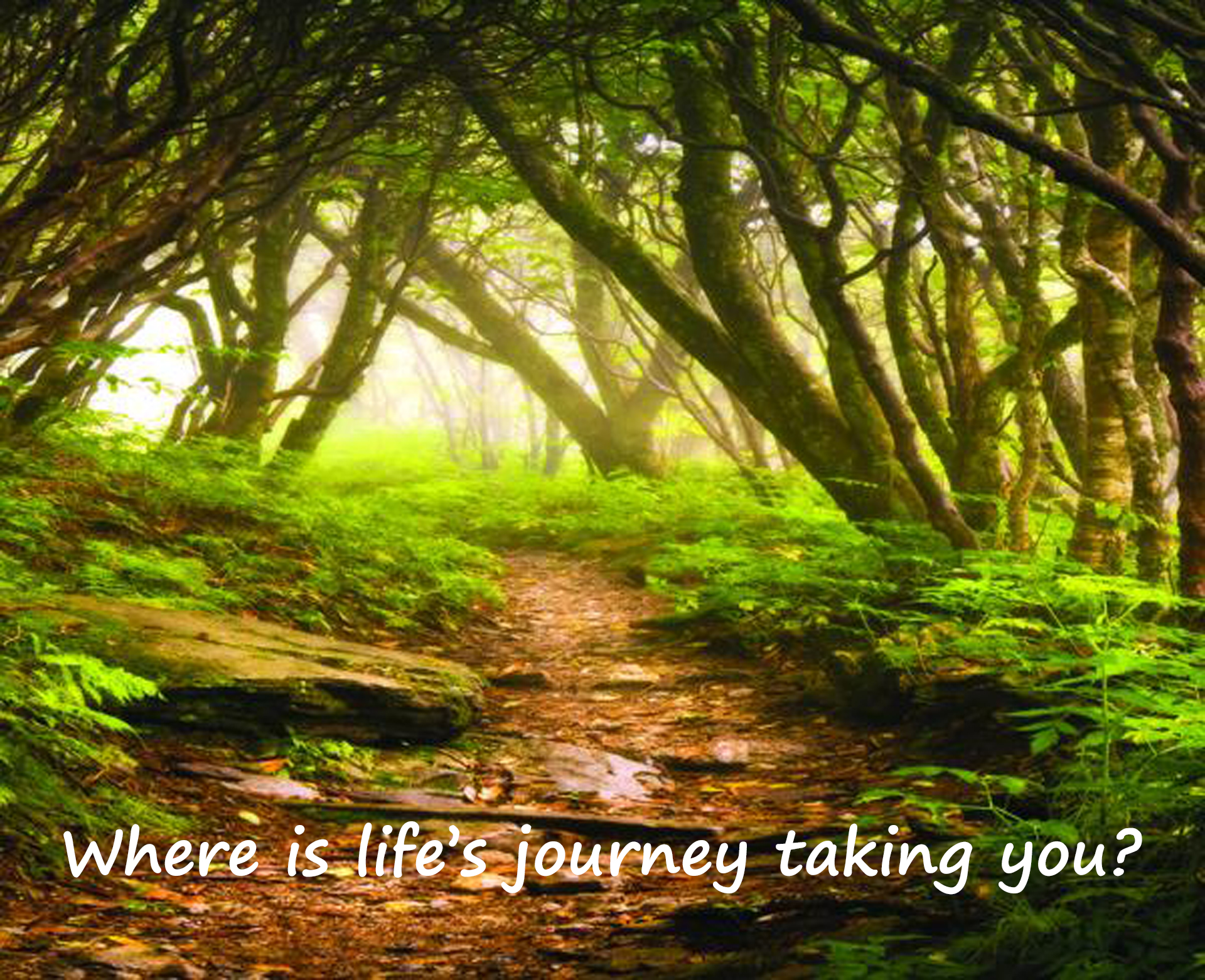
What I am trying to call attention to, has to do with balance, proportion, holism, authenticity, freedom, as well as soul. Airbnb hosts have become angry, because we liked the original vision of Airbnb in its implied valuing of individual soul, individual expression, freedom to do business as micro-entrepreneurs in a way that worked for us and aligned with our own values. We certainly valued making money, but not making money by any means necessary, or did we want to be told 4 or 5 “tricks” that could improve our business and allow us to edge out the competition, but required compromising our values.
And speaking of offering tricks to improve our business — have you noticed the ungodly amount of advertising, spamming and self-promotion that goes on in the host community now? It sometimes seems that half the posts from new members in my group are self-promotional posts. I wonder if this is owing to the “values vacuum” that has unwittingly been created by insufficient attention to valuing collective wisdom in the host community — that is to say, not best practices to make the most money, but best practices to take care of yourself, run your business in a way that works for you, that supports your own needs and allows you to fulfill your purpose and live out something of your soul in the midst of your life.
In the early days, the hosting community was about helping each other and sharing stories. That is still a strong theme in most communities, but there’s another theme that’s entered into the host community, and it’s not one that I like. It’s one that can be deadly for the soul. It’s about making more and more and more money, building an “Airbnb empire”, how to make $2 million in your first year as an Airbnb host, how to acquire more and more and more properties, how to figure out all the tips and tricks and edge out other hosts and make a mint as a host, and other crap like that.
Suffice to say I’m not impressed. Not that I’m opposed to anyone growing their business and having several properties they run as Short term rentals. What bothers me is when I get the sense that making more and more and more money is someone’s primary goal in life. Because that is an empty goal, in and of itself it doesn’t have meaning. Making enough money — yes, that is good. Because when you’re making enough, that may be a very helpful thing actually to help you have time to do things that support the growth of your soul. Not making enough money can be very stressful and living in a survival mode can make it very hard to take care of yourself, and to have the silence and space and down time, the space for leisure, that the soul requires.
Also, often people who focus too much on making money, dont’ think enough about what this is doing to them. How they are compromising, losing themselves along the way.
Perhaps we say, “Oh, I’m not really a spiritual type”, or “Those other people are more artistic or creative than I am”, or “I”m just too busy for that kind of stuff”, but the development of the soul, in whatever way that is meant to unfold in our life, is not something for anyone else to do for us. Too often, we project both bad and good qualities onto others, disowning these in ourselves. Other people are angry, not us. Other people hate, not us. But also — other people are the creative ones, the spiritual ones, or the soulful ones.
In my area for instance, it’s common for well off middle class people to learn Spanish and travel to Latin America, to pepper their homes with “folk” art from remote villages in another country, and to, in a sense, project their soul outward onto other people.  To let other people do their “soul work” for them. Face it, this is a kind of patronization — we “assign” some folk culture in another country to be “the ones who do that soul work for the rest of us”. At the same time, some of us are workaholics in our tech job, and the folk people out there can project all their innate inventiveness, math and logical ability, organizing ability, tech know-how and entrepreneurial spirit onto us, we get “assigned” to do that for them. All of this psychological projection of our growth tasks onto other groups of people mitigates against integration, because one half of humanity isn’t supposed to carry the growth of the other part. We are all called to become integrated, to become whole, in ourselves. So buy intriguing folk art if you like, but let it be a symbol of what YOU want to do and become in your life, not what you remain content to let someone else do for you.
To let other people do their “soul work” for them. Face it, this is a kind of patronization — we “assign” some folk culture in another country to be “the ones who do that soul work for the rest of us”. At the same time, some of us are workaholics in our tech job, and the folk people out there can project all their innate inventiveness, math and logical ability, organizing ability, tech know-how and entrepreneurial spirit onto us, we get “assigned” to do that for them. All of this psychological projection of our growth tasks onto other groups of people mitigates against integration, because one half of humanity isn’t supposed to carry the growth of the other part. We are all called to become integrated, to become whole, in ourselves. So buy intriguing folk art if you like, but let it be a symbol of what YOU want to do and become in your life, not what you remain content to let someone else do for you.
Keeping your business small is actually a good way for it and you to stay soulful. Because the larger a business grows, the more difficulty you will have, keeping your hand and your own personal touch in it. The bigger the business is, the more “automated” it will be, the more “apps” and “tech” you are likely to have, the more employees you have, the less interaction you’ll have with your own guests….and the narrower your involvement in actual hosting. To the point where it would be a misrepresentation to say you are a host. Rather, what you are is a short term rental corporation, and at some point…what you do is so automated and impersonal….you could actually be replaced by a robot or a computer. And that’s not very soulful. 
Keeping your business small allows you to cultivate your soul by having actual meaningful interactions with people, with staying humble and grounded by cleaning your own guest rooms. There’s also something “beautiful” about smallness, which pertains to the salty and earthy folk of the earth.
As well, I think it’s time to just come right out and say it…there’s been a problem of “concept creep” in relation to the term “hosting” and “host.” In the old days when Airbnb began, it was somewhat understood that a host was someone who (preferably) did in-home hosting, or (alternatively, but less preferably) on their property hosting, or even possibly off-their-property hosting, if they had a small business. These days, people are claiming to be “hosts” and doing “hosting” who run 100 to 1000 listings (or more!), have 10 to 20 employees, and/or never actually meet their guests. Let’s cut to the chase — as I see it, you’re not really a “host” if you have a dozen properties and never meet your guests. You’re not a “host” if you have 150 listings and are aiming for Empire. You’re not a “host” if your listing is a room at the Ramada Inn. You may be better described as a short term rental corporation or vacation rental corporation, or perhaps just a giant hotel chain. And in its unfortunate support of such non-hosts, many have felt that AIrbnb has steamrolled the real hosts to make way for corporations. To the extent that it has done this, Airbnb is no longer actually a business centered on “hosting” but is just another VRBO or Expedia, focused on running hotels or vacation rentals.
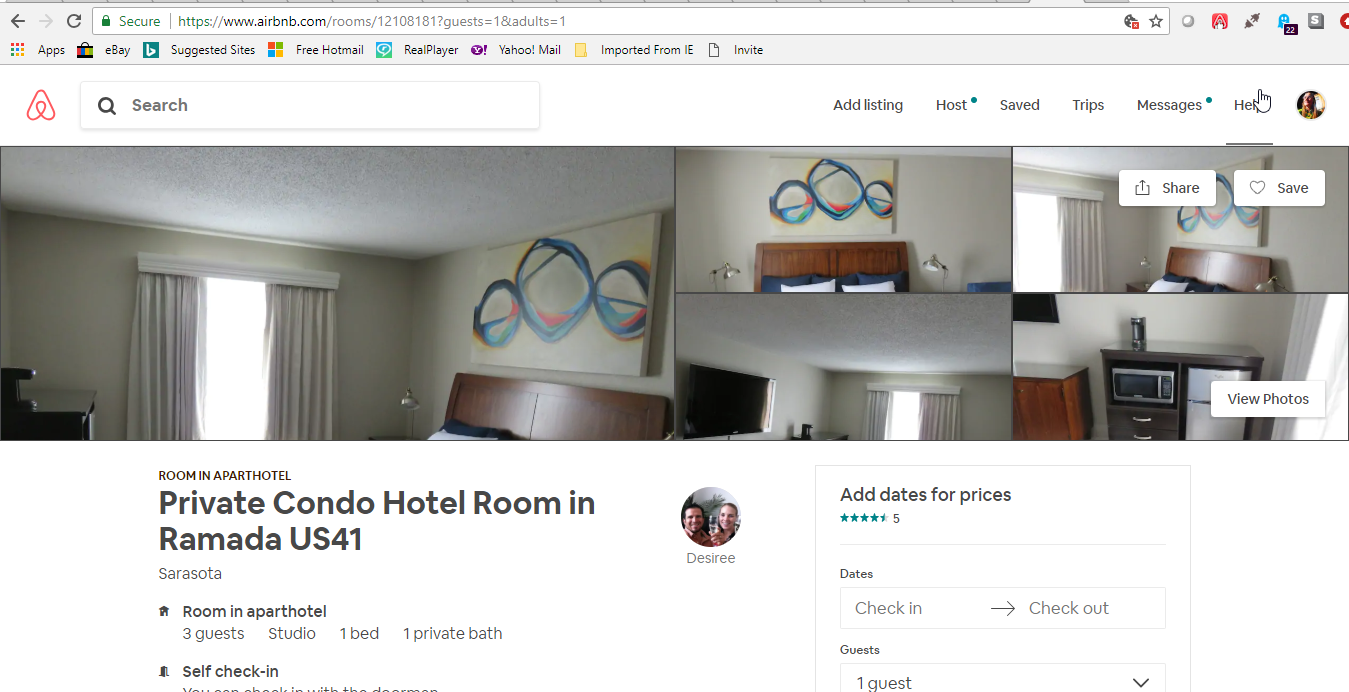
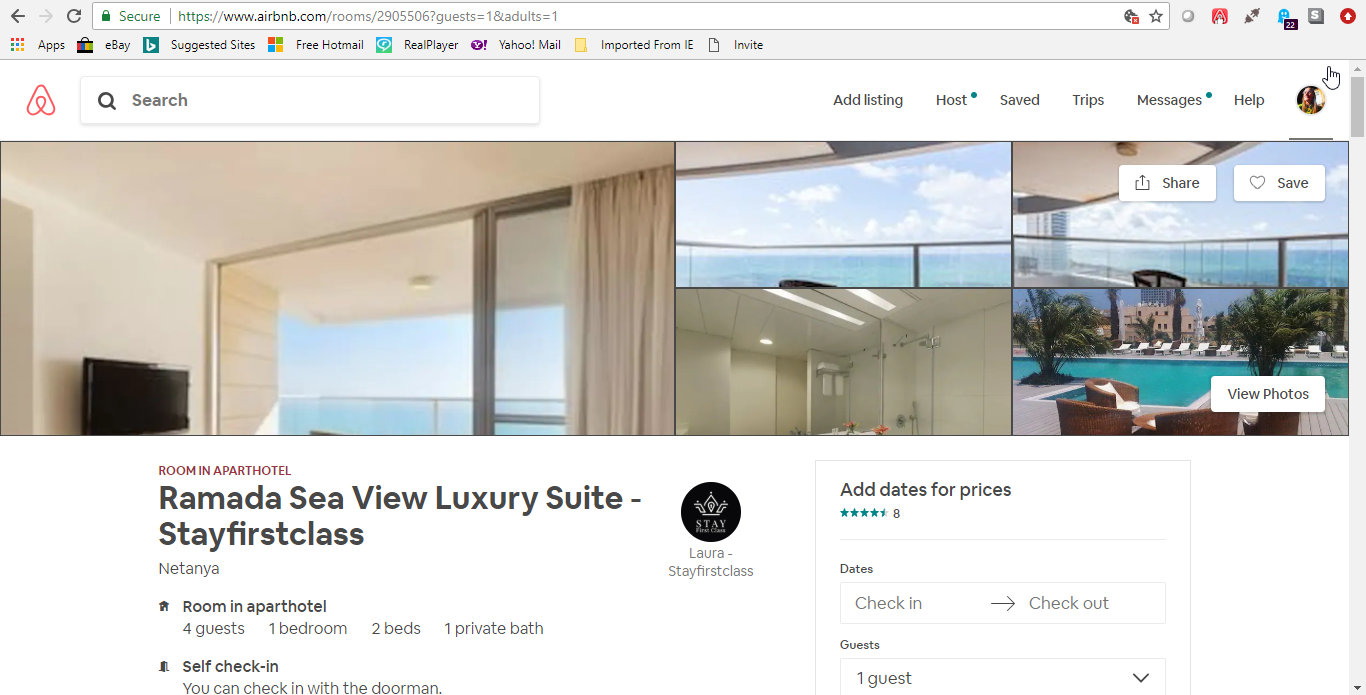
If you’ve watched the development of short term rental regulations in various cities, this distinction in hosting actually is codified into law in many places. Cities will often refer to a listing as “non-hosted” if the host isn’t present when the guest arrives, and/or doesn’t actually live there. This in contrast to a “hosted” listing, which means, a host lives at the property and offers a room for rent or a 2nd unit at the property. This is a good clue about what hosting actually means, which we’d do well to be informed by.
So…responding to the call of colorful folk art is a good start, it can help us focus our interest and intent. But then ask….what more is our soul wanting from us?
So, what I’m saying here, is that there was more “soul” quality in the atmosphere in the early years of Airbnb, and there are many angry AIrbnb hosts these days —- and if we take time to reflect on all this, this reflection can help us identify our own values and ultimately to promote what I will call “Holistic and Authentic Hosting, Hosting with Soul.” Because if we look at it more deeply, I think we’ll see, it’s not just that we are upset that “Airbnb sides more with guests” or that Airbnb’s policy changes make it more difficult for us to screen guests, and protect our homes and ourselves. But really, we are objecting to an interference with our running our business in our own way, and more deeply still, with our ability to express ourselves and live out our unique soul’s path in this world. 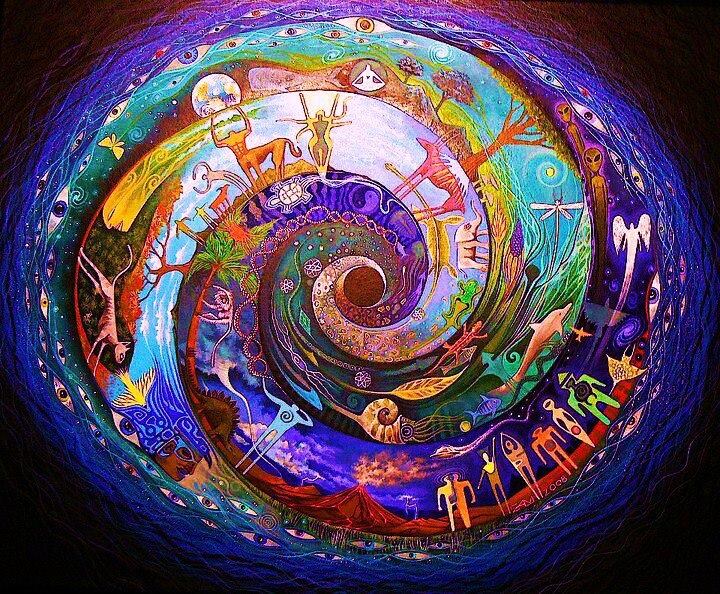
So in this article about hosting holistically, I am essentially calling you to attend to things beyond hosting, things which may emerge and be expressed in your hosting business but which go far beyond that. I am calling on you to attend to your soul and your soul’s journey in this life, and ask what are your deepest values, what is most meaningful for you? I believe that every one of us has a “religion”, even atheists, because I believe that whatever is most meaningful for you in your life, is where your heart is and thus in a symbolic sense and perhaps in a practical sense, what you value most is your religion.
Many people are afraid of questions of meaning, so they keep busy. Keeping busy, they dont’ have to think about it too much, and perhaps can keep at bay those nagging parental voices, such as from our churchbound parents or stale elders about how we were supposed to pray or go to Church. Well, developing the soul is not about going to church, and in fact, some of those who are most diligent about making appropriate observances in their mainstream religion, may be stunted in their soul growth, because your soul doesn’t grow when you only do everything that some institution or nice neat set of dogmas or doctrines, or sacred book tells you to do. No, the challenge your soul presents is to think for yourself, which is why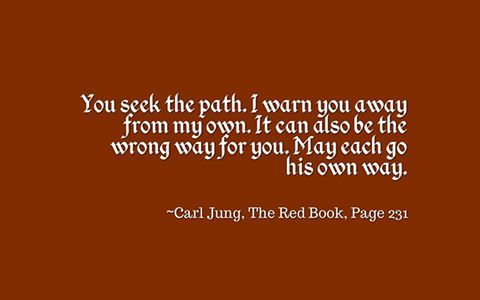 Carl Jung said, “Would you find the way? I warn you away from my own.” He understood well that being true to your soul means listening to your own heart, and only your own heart. No teacher, school, church, temple, doctrine or guru can teach you, but only you, yourself.
Carl Jung said, “Would you find the way? I warn you away from my own.” He understood well that being true to your soul means listening to your own heart, and only your own heart. No teacher, school, church, temple, doctrine or guru can teach you, but only you, yourself. 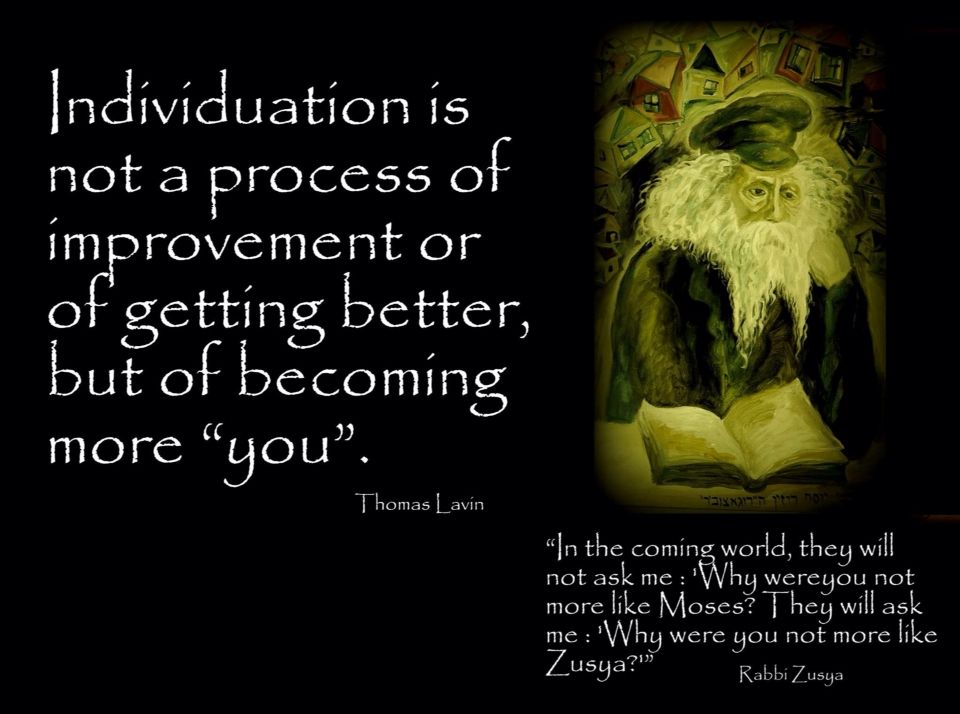
For your task, the task of your soul journey, is to become yourself, not to become someone else.
Now some will say at this point, OMG, you’ve certainly departed from the topic of Airbnb hosting. Well, let’s circle back around.
From what I’ve said here, I mean to distill out some “hosting values” that I intend to advance and advocate for, more clearly. Given the deterioration of the hosting culture in Airbnb, and the superficiality of values in many hosts, I think it’s growing more important for there to be some people to issue a call for these values I am wanting to represent. Because I’m growing fatigued with the “Empire Building” talk and the brown-nosing advice when it appears in the host groups….though truth be told, even the most committed brown-nosers have trouble with their nosey religion when Airbnb yanks out the one thing that they really depended on. 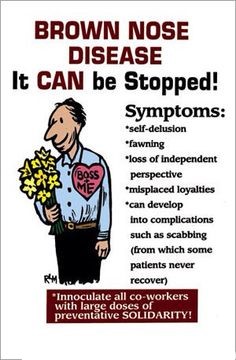
Some may confuse spiritual values with politics, and in particular with things like being welcoming to the rainbow of humanity and supporting non-discriminatory hosting, which some will say they are pleased that Airbnb stands for. Well, having principles and politics is good and this may be part of your soul’s expression, but it is likely not the fullness of it, since the soul is deeper and more complex than politics, principles, doctrines, beliefs. It is more mysterious and paradoxical than all these things. WHich is why, if there is some paradox and contradiction in your hosting, that may well be a good thing.
Holistic and Authentic Hosting, Hosting with Soul
So here are a few suggestions about values that go with holistic and authentic hosting.
(1) First, even though soul is not synonymous with Christianity or Judaism or any particular religious worldview, there are wise sayings that appear under many guises, and one of them is, “You cannot serve both God and Mammon.” This doesn’t mean that you can’t make money and have to become a beggar and live in a box on the sidewalk. Rather it is a message about proportion and where your heart is. You can make money, but do not make money into your God. So first off, holistic hosting is certainly not about fixating on making more and more and more money and building a bigger and bigger AIrbnb Empire, like these guys did: https://www.nytimes.com/2019/02/23/nyregion/airbnb-nyc-law.html Those guys really had an addiction to money making and it’s going to do them in, from the appearances of things.
(2) Second, holistic and authentic hosting means that as much as possible, you want to run your business in your way, not the way some other hosts say is right, and not in the way Airbnb is starting to push you to do. Your hosting business, like everything else in your life, is an expression of the uniqueness of you, and your values. This means, among other things: (a) Your house rules, (b) Your method of screening guests, (c) Your choice of furniture and decor, (d) Your style of interaction with guests. When Airbnb starts to try to take away your right to run things your way, you push back, as far as is possible to do so. You dont’ just accept someone telling you what to do.
In line with putting your own touch on your business….also, though this is not possible for all hosts, particularly hosts with several listings or one or more listings located at distance — ideally, so that our business is an expression of our own soul, we try to do as much as we can by ourselves. This means, not using a property manager, but communicating with the guest ourselves. Meeting the guest ourselves. Cleaning the guest room ourselves. Choosing the furniture and decor ourselves.
(3) You value advice in the host community that helps you live your life and run your business in a way that works for you and supports your values, and you dont’ value advice that seems to come from the perspective of, “Here’s what I suggest you do if you want to make more and more and more money, and get the edge over other hosts, and beat out the competition.”
(4) Valuing your own soul’s journey implies that you also value that someone else is following their path, and that their path is not your path. People who don’t understand the soul or are out of touch with it, can be very oriented to conformity, but those who hear the soul’s call, oppose conformity and its animosity to freedom, while appreciating unconventionality for the way it inspires us all to our own direction. THis means that it’s inherently not in keeping with soul to judge other people or hosts. This doesn’t mean that we dont’ recognize when someone’s giving bad advice, or might have an agenda or ulterior motive. It doesn’t mean that we don’t recognize that the host community has developed some collective wisdom — but it does mean we dont’ blast people just for doing something differently from how we do it.
(5) Being concerned with living holistically, we place importance on self-care and taking care of ourselves in all respects. This means, running our hosting business in a way that does not give short shrift to our own needs, and it means speaking up against policies which show a lack of respect for hosts’ needs. Among other things, we resent being punished by AIrbnb for not using its “optional” instant book feature (because we want to protect our homes and screen our guests) or not being a 5 star listing (because we insisted on confronting guests who violated our house rules, who then retaliated and gave us low ratings) , when Airbnb makes it harder for guests to find our listings if we aren’t instant book hosts or Plus hosts or 5 star hosts or Superhosts.
(6) Finally, we’ve all heard stories like this — the guest who cancelled their reservation because there was an ant in the room or a cobweb in the house. Apart from being stupid and neurotic, this is soul-less, in its fear of nature and lack of a healthy sense of the presence of nature in the world, and nature includes our homes. The idea that houses should be hermetically sealed sterile environments separated from Nature and Earth, is a troubling idea. Every house should have at least one cobweb, and for Gaia’s sake, please let it be a honkin’ BIG one!! 
I hope you preserve a quiet corner of your house — perhaps someplace guests dont’ see very much or have access to — to grow a nice big cobweb and hopefully thereby make a little spider happy. Believe me, this will be good for your soul!



Hi – thanks for writing and sharing – beautifully written ….. but at the end I’m not sure what the main point is – things inevitably change ……. At first when I began hosting I only used Home Away . Home Away sticks to business – they don’t have host support or venting pages on FB – Hosts are on their own to run their own business . When I signed up for Airbnb I was surprised at the community pages to join , experiences to add , Airbnb plus to work towards and venting pages . I was surprised by the venting and it made me nervous about things I hadn’t worried about before. Becoming and learning to be a great host is a
big life education , journey . Those of us who have extra space to share with the world are very lucky . Happy Host at The Goat Cottage ….. @thegoatcottage on Instagram
LikeLike
Hi Barbara, and thanks for your comment!
I think what I am pointing to, may be easier for those to understand, who began as Airbnb hosts. As I see it, “hosting” as it was developed by Airbnb, is something different from the vacation rental business one finds on HomeAway, VRBO, and the like. I dont’ want to say that people are not really “hosts” if what they offer are entire place listings, vacation rentals rather than a room in their home, but I will say that I believe hosting as it was begun by Airbnb was much more related to in-home hosting than out-of-home hosting, and the community of in-home hosts are likely the ones who’ve felt most betrayed and upset by AIrbnb’s move away from its humble in-home hosting origins. We often feel that we’ve been steamrolled to make way for those seeking to profiteer on the phenomenon of hosting.
The connection of soul to our work in the world is not something inherently easily defined. I believe that the point almost has to be made in a sideways manner, through story and symbol and anecdote, rather than directly. So perhaps this article is written in large part to generate reflection and questions, rather than provide neat or easy answers or advice.
LikeLiked by 1 person
Hi – The thing is – as I said above – ” change is inevitable” …….Airbnb grew , then expanded, then experimented – in many ways we who choose to be and/or need to be hosts I feel are quite lucky that Airbnb became a spokesperson entity company – they shown a light on new possibilities for many ….. today there are some hosts who want to be independent of any company like airbnb or homeaway……It is all evolving……. in a way this biz is taking us back to stage coach days when travelers would stay at inns or in barns…….Change, change, change…..can’t stop it no matter what…….
LikeLike
Barbara, I’m not sure I understand the point you’re making about change. It seems as though you’re implying that Airbnb isn’t to be viewed as responsible for the decisions they made that caused certain specific changes, including changes that are not so good for smaller hosts, and instead are suggesting that change just happens without cause.
It’s true that change is inevitable, but it’s also true that there are decision points and certain decisions are made by certain people.
For instance, 2 people get married.
Story one, decide to get jobs in teaching, they teach children, the children grow and benefit from thoughtful and caring teachers, the teachers are content when they retire. Change happens.
Story two, the 2 partners, after marriage, decide to open a business in identity theft and both end up in prison. Change happens.
Point being that just saying “change happens” doesn’t really pertain to the difference in these two short tales. What’s critical is the difference in decisions — and the outcome based on what decisions were made.
On the other hand, if by saying “change, change change” what you really mean to say is that we all need to adapt to whatever is happening, instead of being stuck in the past or in resentment, then I see there is a point to that. However, I’m also saying that inner change happens because we give birth to an intention to make it happen, and that without this intention, the inner change may not occur or go in the direction we would have wanted.
LikeLike
Hi ,
I can’t find your name on the site- sorry.
Per the Airbnb conversation.
I’m an entrepreneur. From that experience & perspective I understand how things can change – sometimes not the way you’d like them too .
If either you or I had tried to start the Airbnb Company how would we have handled it through the years ? Would we have explored every opportunity to grow – share – develop – improve and therefore change ? I would – wouldn’t you ?
Sent from my iPhone
LikeLike
Hi – I’m just reading this now . First time I’ve had time & refound it . I’ve closed my Airbnb for now . Our son & family moved back home which is amazing . I started a painting career . I understand your point of view . My husband would never have liked or allowed strangers in “ our home “ . I was allowed to do it because we had a separate building but he had a hard time anyway . Covid had a huge effect also . Who knows what’s next for our world now ? Take care !
LikeLike